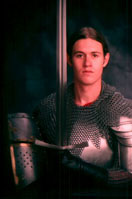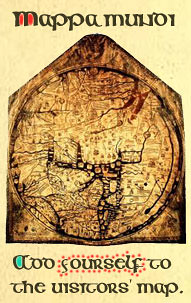Quotations - Islam
"I do not know much about Mohammed or Mohammedanism. I do not take the Koran to bed with me every night. But, if I did on some one particular night, there is one sense at least in which I know what I should not find there. I apprehend that I should not find the work abounding in strong encouragements to the worship of idols; that the praises of polytheism would not be loudly sung; that the character of Mohammed would not be subjected to anything resembling hatred and derision; and that the great modern doctrine of the unimportance of religion would not be needlessly emphasised." G.K. Chesterton, ILN Nov. 15, 1913
"A man making the confession of any creed worth ten minutes' intelligent talk, is always a man who gains something and gives up something. So long as he does both he can create; for he is making an outline and a shape. Mohamet created, when he forbade wine but allowed five wives: he created a very big thing, which we have still to deal with." - G.K. Chesterton, "The Victorian Compromise and Its Enemies" The Victorian Age in Literature
"To do Mohammed justice, his main attack was against the idolatries of Asia. Only he thought, just as the Arians did and just as the Unitarians do, that he could attack them better with a greater approximation to plain theism. What distinguishes his heresy from anything like an Arian or Albigensian heresy is that, as it sprang up on the borders of Christendom, it could spread outwards to a barbaric world." - G.K. Chesterton, "A Note on Comparative Religion" Where All Roads Lead
"When people talk as if the Crusades were nothing more than an aggressive raid against Islam, they seem to forget in the strangest way that Islam itself was only an aggressive raid against the old and ordered civilization in these parts. I do not say it in mere hostility to the religion of Mahomet; I am fully conscious of many values and virtues in it; but certainly it was Islam that was the invasion and Christendom that was the thing invaded." - G.K. Chesterton, "The Way of the Desert" The New Jerusalem
"The effort of the Crusades was sufficient to stop the advance of Islam, but not sufficient to exhaust it. A few centuries after, the Moslem attacked once more, with modern weapons and in a more indifferent age; and, amid the disputes of diplomatists and the dying debates of the Reformation, he succeeded in sailing up the Danube and nearly becoming a central European Power like Poland or Austria. From this position, after prodigious efforts, he was slowly and painfully dislodged. But Austria, though rescued, was exhausted and reluctant to pursue, and the Turk was left in possession of the countries he had devoured in his advance." - G.K. Chesterton, ILN Oct. 10, 1914
"Islam was something like a Christian heresy. The early heresies had been full of mad reversals and evasions of the Incarnation, rescuing their Jesus from the reality of his body even at the expense of the sincerity of his soul." - G.K. Chesterton, "The Age of the Crusades" A Short History of England
"Now a man preaching what he thinks is a platitude is far more intolerant than a man preaching what he admits is a paradox. It was exactly because it seemed self-evident, to Moslems as to Bolshevists, that their simple creed was suited to everybody, that they wished in that particular sweeping fashion to impose it on everybody. It was because Islam was broad that Moslems were narrow. And because it was not a hard religion it was a heavy rule. Because it was without a self-correcting complexity, it allowed of those simple and masculine but mostly rather dangerous appetites that show themselves in a chieftain or a lord. As it had the simplest sort of religion, monotheism, so it had the simplest sort of government, monarchy. There was exactly the same direct spirit in its despotism as in its deism. The Code, the Common Law, the give and take of charters and chivalric vows, did not grow in that golden desert. The great sun was in the sky and the great Saladin was in his tent, and he must be obeyed unless he were assassinated. Those who complain of our creeds as elaborate often forget that the elaborate Western creeds have produced the elaborate Western constitutions; and that they are elaborate because they are emancipated." - G.K. Chesterton, "The Fall of Chivalry" The New Jerusalem
"There is in Islam a paradox which is perhaps a permanent menace. The great creed born in the desert creates a kind of ecstasy out of the very emptiness of its own land, and even, one may say, out of the emptiness of its own theology. It affirms, with no little sublimity, something that is not merely the singleness but rather the solitude of God. There is the same extreme simplification in the solitary figure of the Prophet; and yet this isolation perpetually reacts into its own opposite. A void is made in the heart of Islam which has to be filled up again and again by a mere repetition of the revolution that founded it. There are no sacraments; the only thing that can happen is a sort of apocalypse, as unique as the end of the world; so the apocalypse can only be repeated and the world end again and again. There are no priests; and yet this equality can only breed a multitude of lawless prophets almost as numerous as priests. The very dogma that there is only one Mahomet produces an endless procession of Mahomets. Of these the mightiest in modern times were the man whose name was Ahmed, and whose more famous title was the Mahdi; and his more ferocious successor Abdullahi, who was generally known as the Khalifa. These great fanatics, or great creators of fanaticism, succeeded in making a militarism almost as famous and formidable as that of the Turkish Empire on whose frontiers it hovered, and in spreading a reign of terror such as can seldom be organised except by civilisation…" - G.K. Chesterton, Lord Kitchener
"…but out of the desert, from the dry places and the dreadful suns, come the cruel children of the lonely God; the real Unitarians who with scimitar in hand have laid waste the world. For it is not well for God to be alone." - G.K. Chesterton, "The Romance of Orthodoxy" Orthodoxy
Labels: 2006, Quotations




0 Comments:
Post a Comment
<< Home